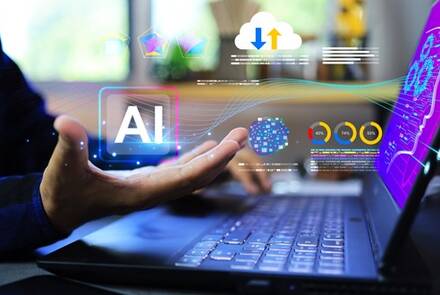11 Ways Artificial Intelligence is Transforming Digital Learning
Artificial Intelligence (AI) has emerged as a groundbreaking force reshaping the landscape of digital learning. AI is creating unprecedented opportunities for both learners and educators, helping improve the effectiveness of digital learning programs.
Here are 11 ways in which AI is impacting the field of digital education.
Personalized Learning Journeys
AI-driven platforms are at the forefront of the transformation in digital learning. These platforms meticulously analyze individual learning patterns and preferences, enabling the customization of content delivery to cater to the unique needs of each student. This personalized approach significantly enhances engagement and comprehension, ensuring that learners progress at their own pace while effectively mastering complex concepts.
Moreover, the power of AI extends beyond just customization; it also allows for the identification of early warning signs of learning difficulties or disengagement. By continuously monitoring student interactions and progress, AI can alert educators to intervene and provide targeted support when needed, ultimately fostering a more supportive and effective learning environment. This proactive aspect of personalized learning ensures that no student is left behind, making education truly inclusive and adaptive to the needs of every individual.
Intelligent Content Creation
Artificial Intelligence is not just a tool for learners but also for educators. AI leverages natural language processing and machine learning to automate the creation of educational materials. This encompasses a wide range of content, from interactive quizzes to comprehensive lesson plans. The result is content that is not only engaging but also accurate and aligned with curriculum standards.
Furthermore, AI-driven content creation not only saves educators valuable time but also fosters innovation in teaching methodologies. Educators can collaborate with AI systems to experiment with new content formats and teaching strategies, pushing the boundaries of traditional education. With AI's assistance, educators can focus more on providing guidance and mentorship to students, creating a dynamic learning ecosystem where creativity and knowledge thrive. This synergy between AI and educators opens up exciting possibilities for the future of education, where the blend of human expertise and artificial intelligence can lead to transformative learning experiences.
Smart Assessment and Feedback
Through the implementation of AI-powered assessment tools, educators can provide instant feedback to students. These systems go beyond traditional grading by evaluating responses, identifying areas of difficulty, and offering targeted suggestions for improvement. This continuous learning loop fosters a deeper understanding of the subject matter.
Additionally, AI-powered assessment and feedback systems contribute to the evolution of assessment practices. They enable educators to move away from standardized testing towards more authentic and holistic evaluations of student performance. By capturing not just the final answers but also the thought processes and learning strategies students employ, AI offers insights into a student's learning journey. This shift from summative to formative assessment promotes a growth mindset, where mistakes are seen as opportunities for improvement, and students are encouraged to take ownership of their learning paths. In this way, AI enriches the educational experience, helping learners develop essential skills for the ever-changing demands of the modern world.
Adaptive Curriculum Design
AI's ability to analyze vast amounts of learning data allows for the refinement and adaptation of curriculum designs. This dynamic approach ensures that educational content remains current and relevant, reflecting real-time advancements in various fields and industries.
Furthermore, AI's impact on curriculum design extends to addressing the diverse learning styles and preferences of students. By continuously adapting content, AI can provide multiple pathways for students to explore topics, accommodating various learning modalities. This adaptability fosters a more inclusive and accessible learning environment, catering to the individual needs of each learner. As AI-driven curriculum design evolves, it has the potential to break down traditional barriers to education, ensuring that knowledge is not only up-to-date but also more accessible and engaging for all learners, regardless of their backgrounds or learning styles.
Virtual Learning Companions
AI-driven virtual companions have become invaluable aids to learners. These companions are capable of answering questions, explaining complex concepts, and engaging in meaningful conversations with students. They create a supportive learning environment, particularly in remote or self-paced learning scenarios.
Moreover, virtual learning companions powered by AI have the potential to foster a sense of inclusivity and diversity in the learning process. These companions can be designed to represent a range of cultural backgrounds, genders, and perspectives, making education more relatable and relatable to a broader spectrum of learners. By offering personalized guidance and interaction, regardless of a student's geographical location or specific learning needs, AI-driven virtual companions are breaking down geographical and cultural barriers, making education a truly global and inclusive endeavor.
Data-Driven Insights
Artificial Intelligence is a powerful tool for harnessing the potential of data in education. By analyzing large volumes of learner data, AI uncovers patterns and trends, providing educators with valuable insights. These insights empower educators to make informed decisions about teaching methodologies and resource allocation, ultimately optimizing learning outcomes (See also: Digital Learning Trends to Watch in 2024).
Additionally, AI's data-driven insights pave the way for a more proactive and student-centric educational approach. Educators can use AI-generated data to identify students who may benefit from additional support or advanced learning opportunities. This data-driven approach not only enhances the learning experience for individual students but also aids in the allocation of resources and interventions where they are most needed. Consequently, education becomes a dynamic and responsive ecosystem that adapts to the unique needs of each learner, ensuring that no student is left behind and that every student can reach their full potential.
Language Translation and Accessibility
AI-powered language translation tools break down language barriers in education, making educational content accessible to a global audience. This inclusivity ensures that learners from diverse linguistic backgrounds can engage with materials in their native languages, democratizing access to knowledge.
Furthermore, AI-driven language translation tools extend their impact beyond just breaking language barriers. They also play a pivotal role in preserving and celebrating linguistic diversity. These tools enable learners to access content in their mother tongue, which not only enhances their understanding but also preserves the richness of various languages and cultures. In a world where globalization is on the rise, AI ensures that educational content is not a one-size-fits-all model, but rather a tapestry woven from the threads of countless languages and cultural perspectives, enriching the educational experience for all.
Collaborative Learning Enhancements
AI fosters collaboration among students by identifying potential study groups or project partners based on their learning styles and preferences. These algorithms promote effective teamwork and the exchange of ideas, enhancing the overall learning experience.
Moreover, AI's role in collaborative learning goes beyond mere matchmaking. It empowers educators to facilitate and monitor group dynamics, ensuring that collaboration is not just about working together but also about learning together. AI can provide insights into the strengths and weaknesses of student teams, enabling educators to offer targeted guidance and resources to enhance group performance. This holistic approach to collaborative learning not only prepares students for the teamwork skills demanded in the professional world but also nurtures a culture of shared knowledge and innovation within educational institutions. As AI continues to evolve, so does its potential to reshape the way students collaborate and learn together.
Continuous Skill Enhancement
AI-powered platforms facilitate lifelong learning by recommending new courses and resources that align with learners' interests and career goals. This encourages individuals to continuously upskill and stay relevant in a rapidly evolving job market.
AI-powered platforms facilitate lifelong learning by recommending new courses and resources that align with learners' interests and career goals. This encourages individuals to continuously upskill and stay relevant in a rapidly evolving job market.
Real-World Simulations
AI-driven simulations immerse learners in practical, real-world scenarios where they can apply theoretical knowledge. This hands-on experience enhances critical thinking and problem-solving skills in a risk-free and controlled environment.
Moreover, AI-powered real-world simulations have a profound impact on preparing learners for the complexities of their chosen fields. These simulations not only enhance critical thinking and problem-solving skills but also foster a deep understanding of how theoretical concepts translate into practical application. By offering a controlled environment where students can experiment, make mistakes, and learn from them, AI-driven simulations bridge the gap between theory and practice. This immersive learning experience prepares individuals to confidently navigate the challenges of their future careers, ensuring they are well-equipped to tackle real-world problems with competence and innovation. As AI continues to advance, so does its ability to create increasingly realistic and enriching simulations, further elevating the quality of education and skill development.
Ethical Considerations
In our pursuit of the benefits of AI in education, we must also acknowledge the ethical considerations that come with it. These include concerns about data privacy, bias, and ensuring equitable access to AI-driven educational resources. Striking a balance between technological advancement and ethical responsibility is crucial for creating an inclusive and secure digital learning environment.
In our pursuit of the benefits of AI in education, we must also acknowledge the ethical considerations that come with it. These include concerns about data privacy, bias, and ensuring equitable access to AI-driven educational resources. Striking a balance between technological advancement and ethical responsibility is crucial for creating an inclusive and secure digital learning environment.
Conclusion
The integration of Artificial Intelligence (AI) into the realm of education is ushering in a new era of learning characterized by customization, interactivity, and data-driven insights. As we embrace the AI revolution in education, we must also remain vigilant to ethical considerations, safeguarding data privacy, mitigating bias, and ensuring equitable access. Striking a balance between technological advancement and ethical responsibility is paramount to creating an inclusive and secure digital learning environment using AI.
For more information about Trigyn’s digital learning services, Contact Us.






